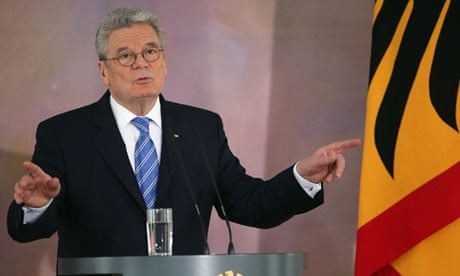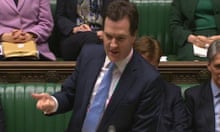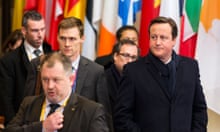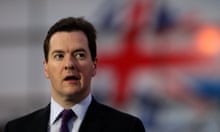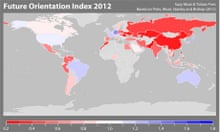Germany's president has called for English to be made the language of the European Union as he appealed to the UK to stay in the EU.
Joachim Gauck earned applause for his remarks, made in Berlin on Friday in a speech on Europe's future at a time of rising German scepticism towards Brussels.
"Dear English, Scots, Welsh, Northern Irish and new British citizens, we want to continue having you on board," he said. "We need your experience as the oldest parliamentary democracy, we need your traditions, your sober-mindedness and your courage."
He said that to encourage a greater sense of commonality, Europe needed a common language as well as encouraging multilingualism. "I am convinced that, in Europe, both can live side by side," he said. "The sense of being at home in your mother tongue, with all its poetry, as well as a workable English for all of life's situations and all age groups."
Appealing to Britons' sense of historical responsibility he emphasised the formative role the UK had played in founding modern Europe by its fight against Nazi Germany; if only for that reason, he said, the UK had an important role to play.
"You helped to save our Europe with your engagement in the second world war – it is also your Europe, and more Europe cannot mean a Europe without you. Only with you can we tackle the future."
The remarks, which took up two minutes of his hour-long speech, followed David Cameron's pledge to call a referendum on Britain's EU relationship, a prospect that has caused much consternation and criticism in Berlin.
Later on in the speech, which was made at his Berlin residence, Schloss Bellevue, Gauck cracked a subtle joke about the prospect of Britain leaving the EU, when he referred to the union's "27 states" before smirking and correcting himself, saying to laughter from the audience: "No, 28 of course."
Gauck used the much anticipated, nationally televised address to call for "more Europe" and greater communication between member states, but also sought to allay fears that Germany was becoming too powerful and aspired to impose a "diktat" on the rest of the continent.
"In Germany, more Europe does not mean a German Europe. For us, more Europe means a European Germany," he said, adding that Germans had a very specific relationship with and sense of obligation towards Europe precisely because of their past. "After all, it was from our country that the attempts to destroy everything European, all universal values, were unleashed," he said.
He pointed out that today's young Europeans "experience more Europe than everyone else before you", and that they had become so used to travelling across the continent without needing to show passports or change money, that they now took those advantages for granted.
But, he said, at a time of crisis, the time had come for Europeans to have a more active relationship with the union. "Don't ask what Europe can do for you, but ask what you can do for Europe," he said.
